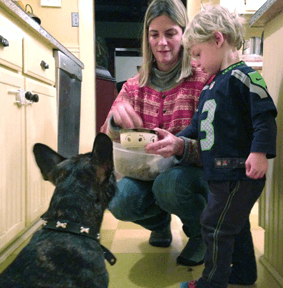Choosing pet food
How to choose what to feed your pet?
This is a topic that I always wish I had more time to delve into during my appointments. It is also a sensitive topic, as there are many different factors that go into why a family chooses a particular diet for their pet such as price, ease of purchasing, families health background and philosophy on food, etc. It is often heartwarming to see how much thought and care most of my clients put into this decision, and I understand how confusing and overwhelming it can be. With the explosion of pet food companies and stores, as well as input from well meaning friends and pet food store employees, it can leave your head spinning.
When I recently acquired my new puppy, Butters, I felt it was a good time to attack the process of choosing the right food for my new friend head-on. I spent many Saturdays while my son was napping pouring over information on the internet that is out there for consumers as well as using the Veterinary Information Network that allows veterinarians like myself to ask questions of veterinarians that are board certified in nutrition. Wow! The volume of information did make my head spin. What I came away with is a series of questions to ask about the pet food diet you are interested in, to make sure it is designed with the best quality and nutrition (as opposed to marketing) in mind.
1. Does the AAFCO nutritional statement say that it is complete and balanced?
AAFCO stands for Association of American Feed Control Officials. Similar to the American Animal Hospital Association (AAHA), AAFCO is a voluntary organization of agencies charged with safeguarding animal feed. The group establishes best practice standards. AAFCO does not regulate, test or certify products. It is the responsibility of the manufacturer to meet the standards and the responsibility of the consumer to only choose food that meets the standards. For more info check out aafco.org/Consumers and/or petfood.aafco.org.
2. Is the food appropriate for the life stage of your pet?
Your pet goes through various lifestages (baby, juvenile, adult, senior, geriatric) just like you do. As a pet ages their nutritional needs change. You should be prepared to reevaluate your pet’s diet every time they reach a new stage of life. Some diets are marketed as being for “all lifestages.” This is counter-intuitive, so research these diets with particular care to make sure they have gone through independent testing to support that claim.
3. Has the diet gone through AAFCO feeding trials?
This is actually less common than you would expect. The feeding trials allow the veterinarians on staff to conduct feeding tests that prove nutritional adequacy. There is significant time and expense to do this, but it definitely gives consumers confidence that this is a well balanced diet.
4. Is there a Veterinary Nutritionist on the food company’s staff?
I was amazed on my quest for a quality diet for Butters how few pet food companies said yes.
5. Who formulates the diets, and what are their credentials?
Surprisingly, the answer is often people with no formal educational background in small animal nutrition.
6. What specific quality control measures are used to guarantee consistency and quality of the food?
Again, AAFCO has developed standards and best practices. Does the manufacturer of the food you’re interested in follow them?
7. Is there a system for tracking recalls?
There should be and the company should be able to share with you exactly what it is.
Finding the answers to these questions can really help you distinguish between excellent marketing and a truly quality diet that has proven to be nutritionally beneficial to your pet. Good Luck! And please remember that the staff at CAWC is always happy to help you dig through the info and answer questions.
For additional info check out www.petnutritionalliance.org or wsava recommendations for selecting pet foods.
Next post: Pet Food Myths


Hi! This is great information. We’re hoping to get a new puppy too. The news in the last several years about manufactured pet food has been troubling. Thanks for your advice. We’ll most likely visit our local pet store and ask for some organic or natural brands to start investigating.